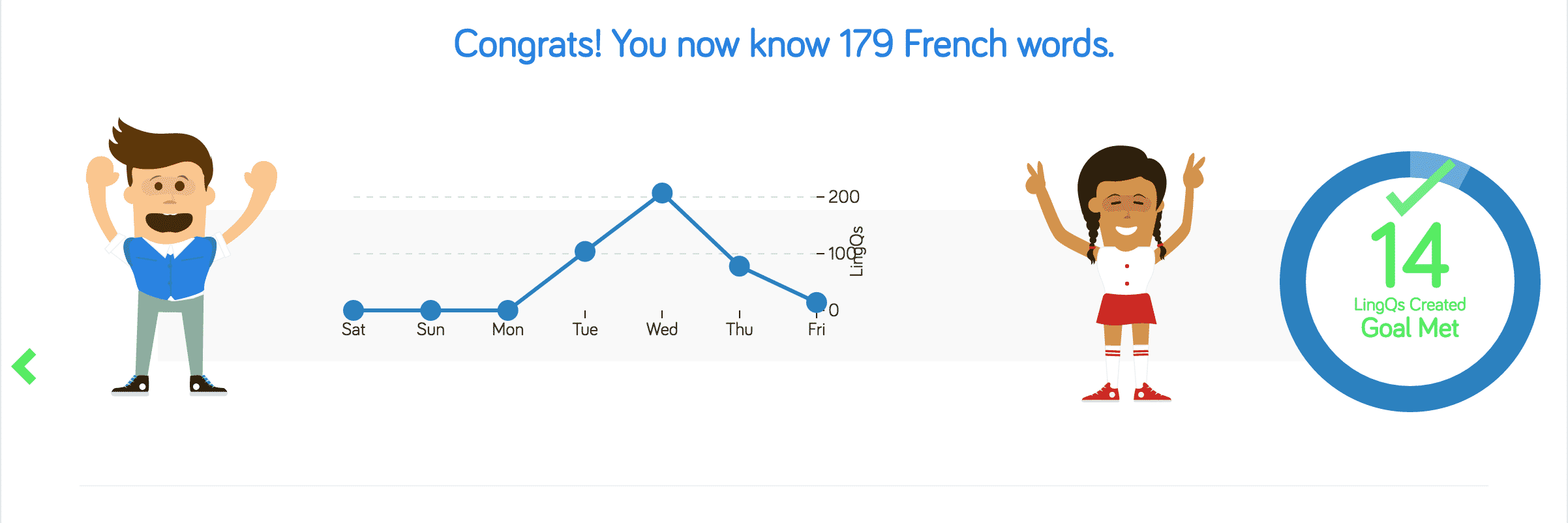How Long Does it Take to Learn a Language?
Language learning depends mostly on three factors: motivation, time and the right attitude. If you have all three, congratulations! You’re going to reach your language learning goals. But how long will it take? Well, that all depends on how many words you know.
Learning vocabulary through listening and reading is the best way to increase your level of proficiency in a language. Let’s start by outlining what those levels of proficiency look like. The LingQ system breaks them down like this:
Beginner 1
You can say and understand some words and phrases.
Beginner 2
You can travel, shop, and talk about familiar subjects.
Intermediate 1
You can function at a basic level at work and in social situations.
Intermediate 2
You are quite comfortable in most situations even if you lack full control.
Advanced 1
You can understand and express even complex ideas in most contexts.
Advanced 2
You can always express ideas accurately and provide subtle nuances of meaning.
The number of words you need to know to move up a level is different depending on what language you’re learning. This table includes all of the languages you can learn on LingQ.
B1 |
B2 |
I1 |
I2 |
A1 |
A2 |
|
English
|
500 |
1,500 |
5,000 |
10,000 |
17,000 |
25,000 |
French
|
575 | 1,700 | 6,000 | 12,500 | 22,000 | 32,500 |
German
|
650 | 2,000 | 7,000 | 14,500 | 25,000 | 37,500 |
Spanish
|
575 | 1,700 | 6,000 | 12,500 | 22,000 | 32,500 |
Polish
|
800 | 2,500 | 10,000 | 20,000 | 37,000 | 55,000 |
Russian
|
800 | 2,500 | 10,000 | 20,000 | 37,000 | 55,000 |
Swedish
|
575 | 1,700 | 6,000 | 12,500 | 22,000 | 32,500 |
Norwegian
|
575 | 1,700 | 6,000 | 12,500 | 22,000 | 32,500 |
Dutch
|
575 | 1,700 | 6,000 | 12,500 | 22,000 | 32,500 |
Greek
|
575 | 1,700 | 6,000 | 12,500 | 22,000 | 32,500 |
Italian
|
575 | 1,700 | 6,000 | 12,500 | 22,000 | 32,500 |
Portuguese
|
575 | 1,700 | 6,000 | 12,500 | 22,000 | 32,500 |
Chinese
|
650 | 2,000 | 7,000 | 14,500 | 25,000 | 37,500 |
Japanese
|
575 | 1,700 | 6,000 | 12,500 | 22,000 | 32,500 |
Korean
|
900 | 3,000 | 11,000 | 22,000 | 42,000 | 62,500 |
Ukrainian*
|
800 | 2,500 | 10,000 | 20,000 | 37,000 | 55,000 |
Hebrew*
|
575 | 1,700 | 6,000 | 12,500 | 22,000 | 32,500 |
Turkish*
|
575 | 1,700 | 6,000 | 12,500 | 22,000 | 32,500 |
Esperanto*
|
575 | 1,700 | 6,000 | 12,500 | 22,000 | 32,500 |
Czech*
|
800 | 2,500 | 10,000 | 20,000 | 37,000 | 55,000 |
Romanian*
|
575 | 1,700 | 6,000 | 12,500 | 22,000 | 32,500 |
Arabic*
|
575 | 1,700 | 6,000 | 12,500 | 22,000 | 32,500 |
Finnish*
|
575 | 1,700 | 6,000 | 12,500 | 22,000 | 32,500 |
Did you find your target language? Daunted by how many words you need to know to move to the next level of proficiency? Don’t be! Language learning is a journey, and if you aren’t enjoying the process, you aren’t going to learn. That’s why the LingQ libraries are full of interesting content to suit all kinds of interests. Your progress is also tracked, so you can see how many words you know and how far away you are from reaching the next level at any time.

So how long does it take to reach each benchmark number of known words? If you put in at least an hour of study a day, you should be able to move up a proficiency level in 90 days. If you’re looking for some motivation to keep you focussed for those three months, join a LingQ 90-Day Challenge.
It’s easy to get in your hour of language study with LingQ. You can listen on the bus to work or read while waiting in line at the grocery store. What are you waiting for?
